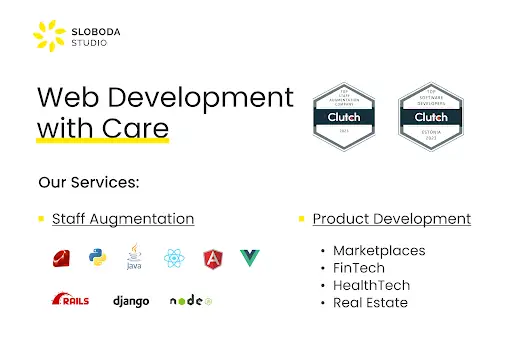A question about how to create an online marketplace can be a rewarding endeavor, offering numerous benefits such as scalability, flexibility, and revenue potential. However, the journey from concept to launch requires careful planning, strategic execution, and a clear understanding of the marketplace landscape.
With over 14 years of experience and a proven track record of delivering over 200 projects, Sloboda Studio stands as a reliable partner for businesses embarking on their marketplace journey. As one of the top software development companies in Europe, Sloboda Studio brings invaluable expertise and insights to the development and launch of online marketplaces.
Benefits of Launching Your Own Marketplace
Online marketplaces have emerged as powerful platforms for connecting buyers and sellers across various industries. Launching your marketplace allows you access to a global audience, reduces overhead costs, and fosters a community of buyers and sellers. Additionally, owning a marketplace allows for greater control over branding, pricing, and user experience, empowering you to create a unique and profitable business model.
Laying the Foundation
Identifying Your Market and Audience
The first step in launching a successful online marketplace is identifying your target market and audience. Conduct market research to understand consumer needs, preferences, and pain points within your chosen industry. By identifying niche markets or underserved segments, you can tailor your marketplace to meet specific demands and differentiate yourself from competitors.
Defining Your Unique Value Proposition
A compelling value proposition is essential for attracting users and gaining traction in the marketplace. Define what sets your platform apart from existing alternatives and communicate this value proposition clearly to potential users. Whether it’s offering unique features, specialized services, or superior customer support, your value proposition should resonate with your target audience and address their needs effectively.
Planning Your Marketplace
Business Model and Revenue Streams
Selecting the right business model is crucial for the success of your online marketplace. Consider options such as commission-based models, subscription plans, or transaction fees, depending on your target market and revenue goals. Evaluate the scalability and sustainability of each model and choose the one that aligns with your long-term objectives.
Legal Considerations and Compliance
Navigating the legal landscape is essential when launching an online marketplace. Ensure compliance with regulations such as data protection laws, consumer rights, and tax requirements. Draft terms of service, privacy policies, and vendor agreements to protect your business and establish clear user guidelines.
Crafting a Business Plan
A well-defined business plan serves as a roadmap for your marketplace venture, outlining your goals, strategies, and financial projections. Consider factors such as startup costs, marketing expenses, and revenue forecasts in your business plan. Regularly review and adjust your plan as your marketplace evolves and grows.
Designing Your Marketplace
User Experience (UX) and User Interface (UI) Basics
Creating a seamless user experience is essential for engaging users and encouraging repeat usage of your marketplace. Prioritize intuitive navigation, clear messaging, and visually appealing design elements to enhance usability and satisfaction. Collaborate with experienced designers, like those at Sloboda Studio, to create a user-centric interface that aligns with your brand identity and resonates with your target audience.
Choosing the Right Platform and Technology Stack
Selecting the right platform and technology stack lays the foundation for the development of your marketplace. Consider factors such as scalability, customization options, and security features when choosing a platform. Sloboda Studio, with its expertise in Ruby on Rails, Django, and other technologies, offers valuable guidance in selecting the most suitable platform and technology stack for your project.
Essential Features and Functionalities
Identify the essential features and functionalities required for your marketplace to operate effectively. This may include user registration, product listings, search and filter options, payment processing, and order management. Prioritize features based on user needs and market trends, and plan for future scalability and expansion.
Developing Your Online Marketplace
Building Your MVP (Minimum Viable Product)
Start with building a Minimum Viable Product (MVP) to test your marketplace concept and gather feedback from early adopters. Focus on delivering core features and functionalities that address the most critical user needs. Iterate and refine your MVP based on user feedback to ensure alignment with market expectations.
Testing and Quality Assurance
Thorough testing and quality assurance are essential to ensure the reliability and performance of your marketplace platform. Conduct usability testing, functionality testing, and security testing to identify and resolve any issues or bugs. Implement rigorous testing protocols to maintain the integrity and trustworthiness of your marketplace.
Security Measures and Data Protection
Security should be a top priority when developing an online marketplace, given the sensitive nature of financial transactions and personal data involved. Implement robust security measures, such as encryption protocols, secure authentication, and regular security audits, to protect user information and prevent unauthorized access or data breaches. Compliance with industry standards, such as PCI DSS, further enhances data protection and builds trust among users.
Vendor and Product Onboarding
Attracting Sellers to Your Platform
Recruiting sellers is essential for populating your marketplace with products and services. Implement marketing strategies to attract sellers, such as targeted outreach, promotional offers, and referral programs. Highlight the benefits of selling on your platform, such as access to a larger audience, streamlined operations, and marketing support.
Setting Up Product Listings and Categories
Organize your marketplace with clear product listings and categories to facilitate browsing and discovery. Create intuitive navigation and search functionalities that allow users to find products easily. Provide sellers with tools and guidelines for creating compelling product listings that showcase their offerings effectively.
Managing Inventory and Orders
Efficient inventory management is critical for ensuring a smooth shopping experience and minimizing stockouts or overselling. Implement inventory tracking systems and order management tools to monitor stock levels, process orders, and manage fulfillment efficiently. Provide sellers with real-time visibility into their inventory and sales performance to optimize their operations.
Launching Your Marketplace
Pre-Launch Marketing Strategies
Generate buzz and anticipation for your marketplace launch through pre-launch marketing strategies. Leverage social media, email marketing, and content marketing to build anticipation and attract early adopters. Offer exclusive promotions or incentives to encourage users to sign up and explore your platform.
Launch Day Checklist
Ensure all systems are in place and functioning smoothly before launching your marketplace. Conduct final testing and quality assurance checks to address any last-minute issues. Prepare marketing materials, press releases, and launch announcements to promote your marketplace effectively.
Collecting Feedback and Making Adjustments
Gather feedback from users during the initial launch phase to identify areas for improvement and refinement. Encourage users to share their experiences and suggestions for enhancing the platform. Use this feedback to iterate and enhance your marketplace based on user needs and preferences.
Final Thoughts
Launching your online marketplace is an exciting and rewarding endeavor that requires careful planning, strategic execution, and ongoing iteration.
By following the step-by-step guide outlined above, businesses can navigate the complexities of marketplace development and launch a successful platform that meets the needs of users and stakeholders. With the expertise and support of experienced development partners like Sloboda Studio, businesses can turn their marketplace vision into reality and establish a thriving presence in the competitive e-commerce landscape.


















